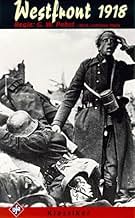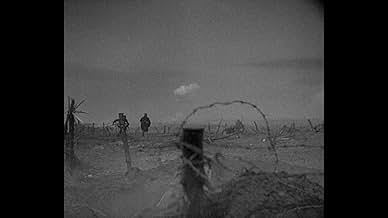IMDb RATING
7.3/10
2.7K
YOUR RATING
A group of German solders fight on the front line in France at the end of World War I.A group of German solders fight on the front line in France at the end of World War I.A group of German solders fight on the front line in France at the end of World War I.
- Director
- Writers
- Stars
- Awards
- 1 win total
Hans-Joachim Möbis
- Der Student
- (as H.J. Moebis)
Aribert Mog
- Undetermined Secdondary Role
- (uncredited)
Gustav Püttjer
- Hamburger
- (uncredited)
André Saint-Germain
- Undetermined Secondary Role
- (uncredited)
Vladimir Sokoloff
- Meal Orderly
- (uncredited)
Ilse Trautschold
- Undetermined Secondary Role
- (uncredited)
Emil Wabschke
- Undetermined Secondary Role
- (uncredited)
- Director
- Writers
- All cast & crew
- Production, box office & more at IMDbPro
Featured reviews
This is the story of life in the trenches during World War 1 from the perspective of 4 German soldiers, one of them a Lieutenant. The fact that they are on the 'other' side makes no difference to the feel of the story or the film's message. War is bad.
There is no particular story to focus on. The film is a sequence of events during wartime and it just carries on after the film has ended, just like it was already in existence once the film had started. It does have dramatic segments, eg, the home visit granted to Gustav Diessl (Karl), the exploits involving Hans-Joachim Mobis (the student) and various battlefield situations, confrontations and realizations.
The film occasionally has slow segments but it is interesting from a social history perspective. What was the point of it all?
There is no particular story to focus on. The film is a sequence of events during wartime and it just carries on after the film has ended, just like it was already in existence once the film had started. It does have dramatic segments, eg, the home visit granted to Gustav Diessl (Karl), the exploits involving Hans-Joachim Mobis (the student) and various battlefield situations, confrontations and realizations.
The film occasionally has slow segments but it is interesting from a social history perspective. What was the point of it all?
My husband and I just finished seeing this movie. We hadn't heard of it before. We were quite impressed. It's an old movie. It was made just at that time when overacted stage conventions were being abandoned for the more subtle gestures of film. Taking that into account, this movie for us packed quite a wallop.
This is a movie about people attempting to fight a war as a group of small-towners who get to know each other and build a society as they go. Although they don't like the war, they are willing to go and do their part. But can these deep relationships endure in the face of an impersonal war machine? And whose fault is it if they can't? Who is responsible for the situation?
There's a fairly slow start, during which the movie establishes relationships, etc. Then there is a decisive battle. Somehow there isn't another trench warfare movie I can think of which really gets the nuances and habits of the people who were in the trenches in World War I, on either side. We don't have anything like it now. And yet it's not gruesome, so don't be worried about that. I'd definitely recommend this movie, especially in mid-2006 in the U.S. This movie asks all the right questions, subtly but effectively.
This is a movie about people attempting to fight a war as a group of small-towners who get to know each other and build a society as they go. Although they don't like the war, they are willing to go and do their part. But can these deep relationships endure in the face of an impersonal war machine? And whose fault is it if they can't? Who is responsible for the situation?
There's a fairly slow start, during which the movie establishes relationships, etc. Then there is a decisive battle. Somehow there isn't another trench warfare movie I can think of which really gets the nuances and habits of the people who were in the trenches in World War I, on either side. We don't have anything like it now. And yet it's not gruesome, so don't be worried about that. I'd definitely recommend this movie, especially in mid-2006 in the U.S. This movie asks all the right questions, subtly but effectively.
Director G.W. Pabst uses sound well in this, his first sound film. There's the noise of continual bombardment, which adds to the visual realism. Moreover, sound serves continuity. Whistling continues from one scene to another in one transition; in another, the music of a band playing at a canteen turns into the drumbeat for marching soldiers. Also endearing of this antiwar statement is that it is not exciting, unlike other supposedly dovish pictures that end up romanticizing battle. There's the screaming Frenchman between trenches. An artillery firing line is too short, hitting patriot trenches. A return home on leave has a soldier discovering that his wife trades sex to get by.
The framing, editing and visual quality are adept, as one would expect from Pabst, if not from an early sound film. I especially liked the framing and fluidity of the staircase goodbye. There's a surveying moving camera, as there is in "All Quiet on the Western Front". The long battle sequence at the end is the climax of the salient film-making. There is a very long take from an unmoving position, as if the camera were a hidden soldier observing; it is unexciting, yet my attention was not discouraged.
The framing, editing and visual quality are adept, as one would expect from Pabst, if not from an early sound film. I especially liked the framing and fluidity of the staircase goodbye. There's a surveying moving camera, as there is in "All Quiet on the Western Front". The long battle sequence at the end is the climax of the salient film-making. There is a very long take from an unmoving position, as if the camera were a hidden soldier observing; it is unexciting, yet my attention was not discouraged.
In this German WW1 movie from director G. W. Pabst, the film follows a small group of German infantrymen during the waning days of the war. The "Student" (Hans-Joachim Moebis), a young eager soldier, volunteers for dangerous messenger duty in order to grab time with a nearby village girl (Jackie Monnier). Karl (Gustav Diessl) pines for his wife back home, but a trip back during leave doesn't bring the desired results. And all around them rains death and destruction. Also featuring Claus Clausen.
This makes for an interesting companion piece to this same year's All Quiet on the Western Front. This movie is a bit rawer, with some minor fondling and cursing that wouldn't have made it into a US film, even during the pre-code era. The performances are all good, and I especially liked the turn by Clausen as an intense lieutenant in over his head. There's a section in a beerhall with a USO-type show featuring musicians, a raunchy singer, and a clown, that goes on a bit too long. The last 15 minutes or so are some of the most devastating war scenes in film. Highly recommended. .
This makes for an interesting companion piece to this same year's All Quiet on the Western Front. This movie is a bit rawer, with some minor fondling and cursing that wouldn't have made it into a US film, even during the pre-code era. The performances are all good, and I especially liked the turn by Clausen as an intense lieutenant in over his head. There's a section in a beerhall with a USO-type show featuring musicians, a raunchy singer, and a clown, that goes on a bit too long. The last 15 minutes or so are some of the most devastating war scenes in film. Highly recommended. .
Invariably any piece of art banned by the Nazis as degenerate or in this case "cowardly defeatism" has something to offer. G.W Pabst crafts a powerful antiwar film by simply showing so many of its truisms - the senseless, horrific death of course, but also many other subversive elements, e.g. the possibility of friendly fire, the idiotic decisions made by leaders who are out of harm's way being served posh courses of food, one's wife or girlfriend being unfaithful, and the psychological trauma. At his best he simply leaves the camera stationary in longshot while men scurry about and kill one another for no good reason, letting the viewer draw their own conclusion about the madness they're witnessing.
I have to say though, the impact of it all was a little lessened because the images and concepts weren't as novel for me 90 years later, as unfair to the film as that might be. It lags as well when it's off the battlefield, showing among other things an uninteresting (and long) performance at a canteen, and the confrontation with the wife in bed with another man. I think it was trying to balance out the warfare and build up characters so that we were invested in them, but I struggled to stay interested (this and the bleakness of the thing make it one I wouldn't reach for again). Kudos to Pabst for making it, and I loved the way he closes it with "The End?!", certainly well aware of growing militarism and possibility for another devastating war.
I have to say though, the impact of it all was a little lessened because the images and concepts weren't as novel for me 90 years later, as unfair to the film as that might be. It lags as well when it's off the battlefield, showing among other things an uninteresting (and long) performance at a canteen, and the confrontation with the wife in bed with another man. I think it was trying to balance out the warfare and build up characters so that we were invested in them, but I struggled to stay interested (this and the bleakness of the thing make it one I wouldn't reach for again). Kudos to Pabst for making it, and I loved the way he closes it with "The End?!", certainly well aware of growing militarism and possibility for another devastating war.
Did you know
- TriviaThis film was banned by the Nazis after they came into power in Germany in 1933.
- GoofsThe depth of the trenches is inaccurate. In several scenes where the soldiers are standing up, their heads are higher than the top of the trench, making them easy targets for snipers and also allowing the French to monitor troop movements.
- Quotes
Woman in rationed food line: What are you doing? Back of the line!
Another Woman in rationed food line: What's wrong with the old cow? Cutting in line!
Man in rationed food line: Leave the woman alone.
Woman cutting in rationed food line: My Adolf is dead.
Woman in rationed food line: Think you're the only one? That's no reason to cut in line. Go to the back!
- ConnectionsEdited into A Hellish Chaos (2017)
- How long is Westfront 1918?Powered by Alexa
Details
- Runtime
- 1h 15m(75 min)
- Color
- Aspect ratio
- 1.20 : 1
Contribute to this page
Suggest an edit or add missing content














